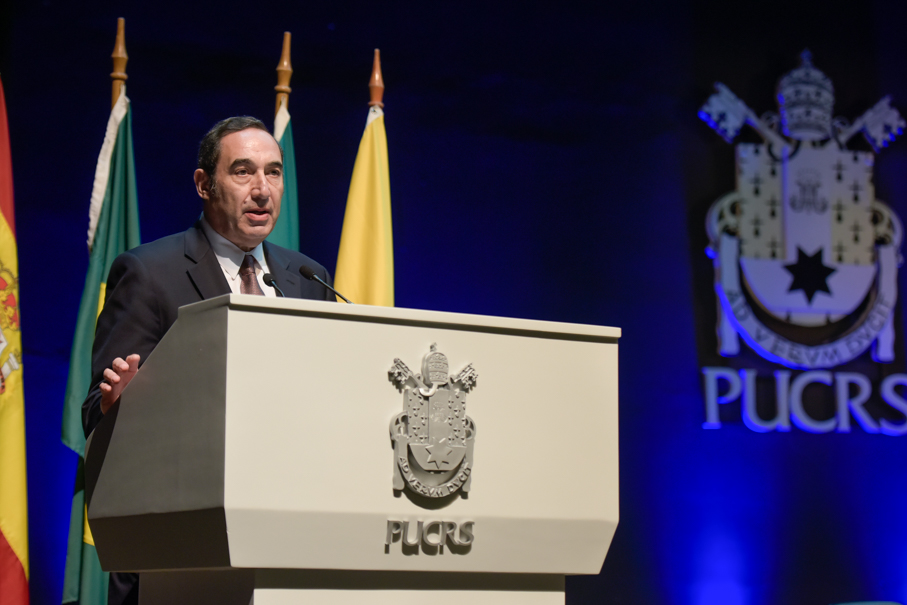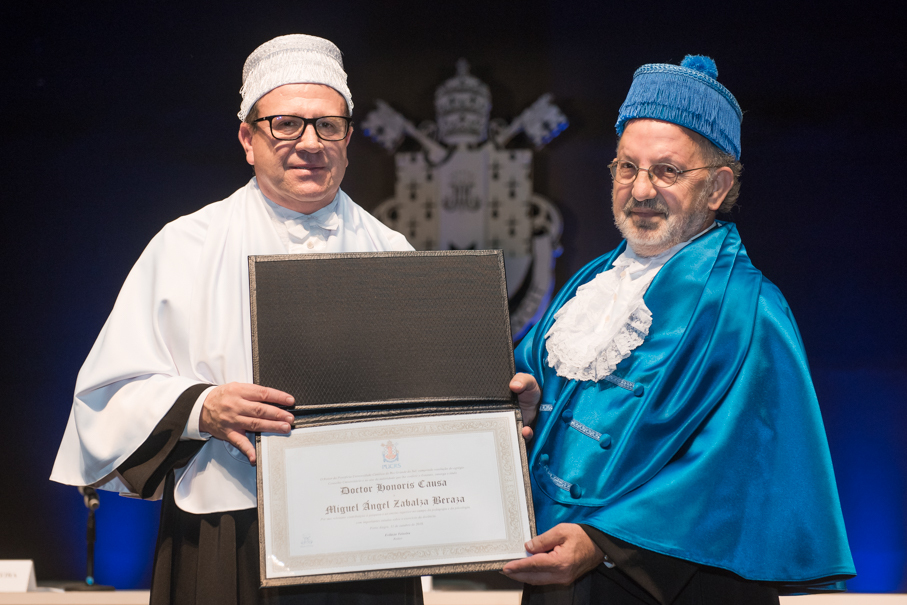At the event, Professor Miguel Zabalza received Honorary Degree from PUCRS

Cabrera advocates responsibility to society and civic education for graduates to produce positive impact on society/Images: Bruno Todeschini
Student activism and social commitment begin even before they get into college but their engagement remains throughout their professional life. That was one of the topics addressed by Professor Roberto Cabrera, researcher at the University of Maryland (USA), at the opening session of the 10th Ibero-American Congress of University Teaching (CIDU), at the Commencement Hall of PUCRS. The central theme O envolvimento estudantil na Educação Superior (Student Activism in Higher Education) served to offer an international and interdisciplinary scenario for the exchange of ideas and experiences on university and quality teaching. The activity was offered in support of the 70th anniversary of PUCRS.
The President, Br. Dr. Evilázio Teixeira, and the president of the Ibero-American Association of University Teaching (AIDU) and professor of the Universidade de Santiago de Compostela (Spain), Miguel Zabalza, opened the 10th CIDU. Dr Teixeira mentioned that “education should be permanent: it is a continuous construction of the individuals, their knowledge and skills, but also of their faculty of judgment and action. Hence, the relationship between faculty and students are essential for it as these parties play a very important role”. On the other hand, Professor Zabalza went over the previous editions of CIDU and was very enthusiastic about the event being held in Brazil, after having been offered in countries such as Chile, Mexico, Peru and Argentina.
In his lecture, Cabrera presented the findings of scientific publications and ongoing research in the USA that seek to assess and understand the extent to which university students are engaged in actions of social impact. An advocate of researcher Alexander Astin, for whom student activism represents the amount of physical and psychological energy they devote to academic life, Cabrera claimed that it is very important to address things such as responsibility to society and civic education for one to be able to produce positive impacts to society.
A recently published MIT study was presented during the conference. The study has found that the teaching programs of the top 10 Engineering schools, including PUC Chile, focus on practices that promote projects with solutions for real problems in society and the environment.

The President, Br. Dr Evilázio Teixeira, and the president of the Ibero-American Association of University Teaching, Miguel Zabalza
At the event, Professor Miguel Ángel Zabalza Beraza received an Honorary Degree, by the School of Humanities. Zabalza is one of the most important authorities in university teaching all over the world.
School of Humanities Professor Dr Maria Inês Corte Vitória, represented the University Council of PUCRS. In her view, Zabalza has been such a competent scientist, teacher, educator, psychologist and linguist in his relevance for university teaching is unquestionable. “His investigations enjoy prestige and relevance all over the world. He’s got hundreds of relevant articles as well as more than 200 scientific works”, said she.
In his speech, Zabalza could not control his excitement for being awarded such degree during the celebration of the university’s 70th anniversary. He shared with the audience some of the things he has learned over the course of these 30 years he has been more actively engaged in Brazil. “First of all, I learned important things that made me believe in education and grow professionally. The relationship between European countries and education is not as strong as it is here. I have seen many people fighting for opportunities. The affective relationship between professors and students was something else I learned here”, added he.
The way Dr Evilázio Teixeira sees it, it is such an honor for PUCRS to have Zabalza as one of the recipients of an Honorary Degree, as he is now a friend and member of the university community. “His career reminds us that the university must be attentive to maintain, or even, restore its contributions to society with an eye to the production of knowledge”, claims he.
Zabalza delivered the closing conference of the 10th CIDU. The presentation Coreografías didácticas y Engagement, discussed the role of universities as teaching centers, up to the points they would be seen as spaces for life, by looking at learning contexts. Most of his speech was on the importance of quality of life in the academia in view of the pressure exerted both on students and faculty. He mentioned that the President of the Universidad Politécnica de Madrid wondered whether the university was actually fulfilling its role and offering students what they really need.
He claims that talking about happiness in the university is of extreme importance and this should not be restricted to TV programs. “We need to get past that”, added he. As an example, he mentioned the 2011 Unesco document, that looks at freedom as a fundamental goal of human life. He also mentioned examples from the University of Yale, in the USA. The course on Psychology and Good Life, offered this year, was the most requested course in the history of the institution, with a number of 1,182 students enrolled; other examples from the University of Stanford, in the US, and the Universidade de Brasília were mentioned, too. As for Yale, the offer of the course was a response to data collected in 2013, which showed that 50% of the academic community sought mental health counseling. Zabalza associates happiness to student activism.